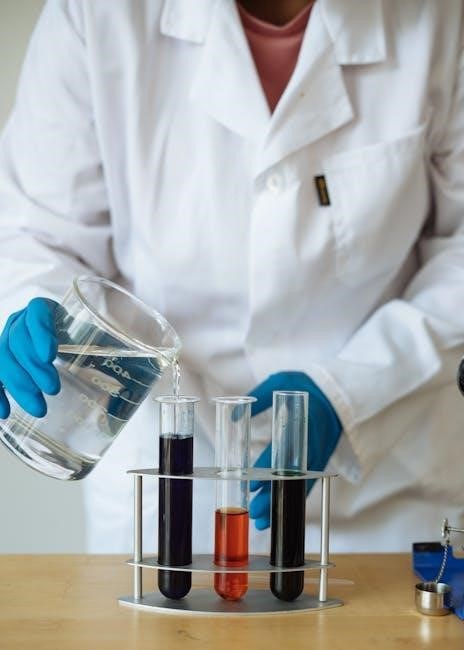The ACS General Chemistry Exam assesses understanding of fundamental chemical concepts. It includes 75 multiple-choice questions, covering topics like atomic structure, stoichiometry, and thermodynamics, within 110 minutes.
1.1 Overview of the Exam Structure
The ACS General Chemistry Exam consists of 75 multiple-choice questions, designed to test a student’s understanding of fundamental chemical concepts. The exam is timed, with a duration of 110 minutes, and covers a wide range of topics, including atomic and molecular structure, chemical formulas, stoichiometry, thermodynamics, and electrochemistry. The questions are structured to assess both conceptual knowledge and problem-solving skills. Practice exams and study guides, such as the official ACS guide, provide valuable insights into the exam format and content, helping students prepare effectively. Understanding the structure is crucial for strategic studying and time management during the actual test.
1.2 Importance of the Study Guide
The official ACS General Chemistry Study Guide is a vital resource for exam preparation. It provides a comprehensive overview of exam content, including key topics like atomic structure, stoichiometry, and thermodynamics. The guide offers practice questions, sample tests, and detailed explanations to help students assess their knowledge and identify areas for improvement. By using the study guide, students can familiarize themselves with the exam format, refine their problem-solving skills, and build confidence. It is an essential tool for strategic and effective preparation, ensuring students are well-equipped to succeed on the ACS General Chemistry Exam.

Key Topics Covered in the ACS Exam
The ACS General Chemistry Exam covers fundamental concepts such as atomic and molecular structure, chemical formulas, stoichiometry, thermodynamics, and electrochemistry, ensuring a broad understanding of general chemistry principles.
2.1 Atomic and Molecular Structure
The ACS General Chemistry Exam extensively covers atomic and molecular structure, focusing on fundamental concepts such as electron configurations, periodic trends, and chemical bonding. Students are expected to understand atomic orbitals, molecular geometry, and the relationship between structure and properties. Key topics include the periodic table, Lewis structures, VSEPR theory, and hybridization. The exam also tests knowledge of intermolecular forces and their impact on physical properties. Mastery of these concepts is crucial, as they form the foundation for more advanced topics like stoichiometry and thermodynamics. Practice problems and conceptual questions help assess understanding of these principles.
2.2 Chemical Formulas and Stoichiometry
Chemical formulas and stoichiometry are foundational concepts in the ACS General Chemistry Exam. Students must master skills in writing balanced chemical equations, calculating molar relationships, and determining limiting reactants. Key topics include empirical and molecular formulas, percent composition, and stoichiometric ratios. The exam tests the ability to apply these concepts to real-world problems, such as determining the mass of products formed in a reaction. Understanding mole ratios and dimensional analysis is critical. Practice problems often involve calculating theoretical yields and converting between moles, grams, and volumes. Proficiency in stoichiometry is essential for solving quantitative chemistry problems effectively.
2.3 Thermodynamics and Electrochemistry
Thermodynamics and electrochemistry are critical areas on the ACS exam. Thermodynamics focuses on energy changes, including entropy, enthalpy, and Gibbs free energy. Students must understand how to calculate these quantities and apply them to determine spontaneity of reactions. Electrochemistry covers redox reactions, cell potentials, and electrochemical cells. Key concepts include the Nernst equation, faraday’s laws, and the behavior of voltaic cells. The exam tests the ability to relate thermodynamic properties to electrochemical processes, such as predicting cell potentials and analyzing reaction feasibility. Mastery of these topics is essential for solving advanced chemistry problems effectively.
Effective Study Strategies for the ACS Exam
Utilize the official study guide, practice with past exams, and focus on weak areas. Regular timed practice tests help build confidence and improve time management skills.
3.1 Utilizing the Official Study Guide
The official ACS General Chemistry study guide is an essential resource for exam preparation. It provides comprehensive coverage of exam topics, including atomic structure, stoichiometry, and thermodynamics. The guide features over 600 practice problems, divided into first-term and second-term material, ensuring thorough preparation. Students should review each chapter, focusing on concept mastery rather than memorization. Working through practice problems helps identify weak areas and builds problem-solving skills. Regular use of the guide ensures familiarity with exam format and content, boosting confidence and readiness for the ACS General Chemistry Exam.
3.2 Practicing with Past Exam Papers
Practicing with past ACS General Chemistry exam papers is a proven strategy to enhance preparation. These papers provide real exam questions, helping students understand the format and difficulty level. By simulating exam conditions, such as timed sessions, students can improve time management and reduce anxiety. Reviewing past papers identifies recurring topics and common question types, allowing focused study. Additionally, analyzing incorrect answers helps clarify misunderstandings and strengthens problem-solving techniques. Regular practice with past exams builds familiarity and confidence, ensuring readiness for the actual ACS General Chemistry Exam.
3.3 Focusing on Weak Areas
Identifying and addressing weak areas is crucial for effective ACS exam preparation. Start by taking untimed practice tests to pinpoint gaps in knowledge. Use the official study guide to review challenging topics, such as electrochemistry or stoichiometry. Track recurring mistakes and dedicate extra study time to these concepts. Engage in active learning by teaching others or explaining difficult ideas aloud. Regular review of weak areas ensures a strong foundation. By systematically addressing these gaps, students can build confidence and improve their overall performance on the ACS General Chemistry Exam.
Practice Exams and Their Role in Preparation
Practice exams simulate real test conditions, helping assess readiness and improve time management. They provide insights into strengths and weaknesses, guiding focused study and strategy refinement.
4.1 Benefits of Taking Timed Practice Tests
Taking timed practice tests is essential for exam preparation. It simulates real exam conditions, helping students manage their time effectively and identify weak areas. Regular practice enhances problem-solving speed and accuracy. Additionally, timed tests reduce exam-day anxiety by familiarizing students with the exam format and content. Using the official ACS General Chemistry study guide PDF, students can access authentic questions, ensuring they are well-prepared for the challenges of the actual exam. This methodical approach builds confidence and improves overall performance, making it a crucial part of a successful study plan.
4.2 Analyzing Test Results for Improvement
After taking practice tests, analyzing results is crucial for targeted improvement. Identify areas of strength and weakness, focusing on concepts requiring more review. The ACS General Chemistry study guide PDF provides explanations for incorrect answers, helping students understand mistakes. By reviewing problem-solving strategies and time management, individuals can refine their approach. Tracking progress over multiple tests reveals improvement patterns and highlights areas needing additional focus. This analytical process ensures efficient use of study time, leading to better overall performance on the actual exam. Regular review of test results is key to achieving success in the ACS General Chemistry Exam.
The ACS General Chemistry Study Guide
The official ACS General Chemistry study guide PDF includes 201 pages of detailed information, covering first-term and second-term material, with over 600 practice problems to aid preparation.
5.1 Features of the Official Guide
The official ACS General Chemistry Study Guide is a comprehensive resource designed to prepare students for the exam. It features over 600 practice problems, divided into first-term and second-term material, allowing targeted study. The guide includes detailed explanations for correct and incorrect answers, enhancing understanding. Additionally, it covers essential concepts like atomic structure, stoichiometry, and thermodynamics. The guide is structured to align with the exam format, ensuring familiarity with question types and content. This makes it an indispensable tool for identifying and addressing knowledge gaps effectively.
5.2 How to Use the Guide Effectively
To maximize the benefits of the ACS General Chemistry Study Guide, students should adopt a structured approach. Begin by reviewing each chapter, focusing on concepts tested on the exam. Complete practice problems without time constraints initially, then progress to timed sessions to simulate exam conditions. Analyze incorrect answers to identify weak areas and review relevant sections. Use the guide’s explanations to clarify doubts and reinforce learning. Regularly assess progress by tracking scores and adjusting study plans accordingly. This method ensures efficient preparation and builds confidence for the actual exam.

Common Challenges and Solutions
Common challenges include time management and understanding complex concepts. Solutions involve timed practice tests, breaking down difficult topics, and using the official study guide effectively.
6.1 Managing Time During the Exam
Effective time management is critical for success on the ACS General Chemistry Exam. Allocate approximately 1.5 minutes per question to ensure thorough consideration of each option. Start by skimming through the entire exam to identify easier questions and tackle them first, saving tougher ones for later. Use the process of elimination to narrow down answers when unsure. Avoid spending excessive time on a single question, as this can jeopardize completing the exam. Practice timed mock exams to refine pacing and build confidence in decision-making under pressure.
6.2 Understanding Difficult Concepts
Mastering challenging topics requires a systematic approach. Utilize the official ACS study guide to identify and focus on problematic areas. Break down complex concepts into simpler components, such as balancing redox reactions or understanding equilibrium principles. Visual aids like diagrams and videos can enhance comprehension. Regular practice with past exam questions helps reinforce these concepts. Seek clarification through study groups or online forums when stuck. Consistent review and active problem-solving are key to overcoming difficult topics and achieving exam success.

Exam Day Tips and Tricks
Arrive early, stay calm, and manage your time wisely. Bring a calculator and valid ID. Read questions carefully and eliminate incorrect options before answering.
7.1 Preparing for the Exam Environment
Simulate exam conditions by practicing in a quiet, unfamiliar setting; Use a timer to adapt to the 110-minute format. Organize all necessary materials, such as pens, calculators, and your study guide. Familiarize yourself with the exam layout and question types. Ensure your mental and physical readiness by getting adequate rest and eating well. Plan to arrive early at the test location to avoid last-minute stress. Staying calm and focused will help you perform at your best. Proper preparation of the environment and mindset is key to success on exam day.
7.2 Staying Calm and Focused
Staying calm and focused during the ACS General Chemistry Exam is crucial for optimal performance. Begin with deep breathing exercises to reduce anxiety. Maintain a positive mindset by reminding yourself of your preparation. Skim through the exam to identify easier questions first, building confidence early. Allocate time wisely, avoiding excessive dwelling on single questions. Use relaxation techniques, such as briefly closing your eyes, to recharge between sections. Visualize success to stay motivated. By managing stress and maintaining composure, you can approach the exam with clarity and confidence, ensuring you perform to the best of your ability.

Additional Resources for Preparation
The ACS General Chemistry Exam preparation can be enhanced with additional resources such as recommended textbooks, online study materials, and active participation in study groups or forums.
8.1 Recommended Textbooks and Online Materials
For effective preparation, the ACS General Chemistry Study Guide is essential, offering detailed explanations and practice questions. Textbooks like Chemistry: The Central Science provide foundational knowledge. Online resources such as Khan Academy and Coursera offer supplementary lessons. Additionally, platforms like ACS Publications and Chemeddl provide access to past exams and study aids. Utilize these materials to reinforce concepts and practice problem-solving skills, ensuring comprehensive preparation for the exam.
8.2 Joining Study Groups or Forums
Engaging in study groups or online forums enhances collaborative learning and problem-solving. Platforms like Reddit’s r/chemistry or ACS-sponsored forums connect students globally, fostering discussion on challenging topics. Sharing resources, such as the ACS General Chemistry Study Guide, and exchanging practice strategies can deepen understanding. Active participation in these communities provides motivation and accountability, helping students stay on track. Additionally, peer explanations often offer fresh perspectives, making complex concepts more accessible. Utilize these spaces to clarify doubts, gain insights, and build confidence for the exam.
